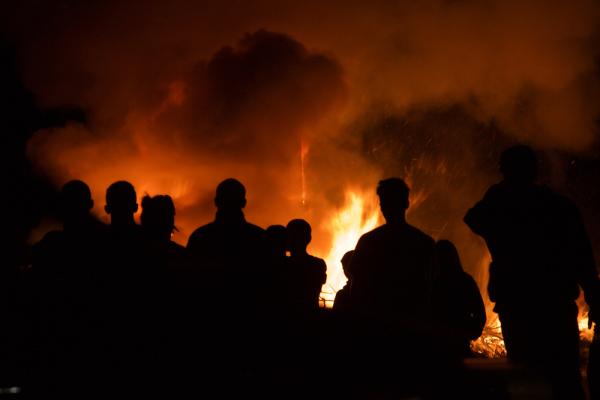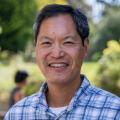This week, large swaths of the San Francisco Bay Area will be without electricity for at least a day and a half in order to prevent power lines from sparking wildfires like last year’s Camp Fire.
While California’s deadliest and most destructive wildfire raged in 2018, the Bay Area registered “very unhealthy” levels of air particulates. Officials closed schools due to the smoke and instead opened filtered air shelters for residents. Almost everyone who had to be outside went incognito as they wore face masks in this strange, apocalyptic moment.
In San Francisco’s Chinatown, however, lower-income residents couldn’t get away from the smoke. In fact, they had to keep their windows open because the indoor smells were even worse.
“When you enter our building, you can tell if someone is cooking a certain soup, if they’re going to the bathroom, or if they’re smoking,” complained Ms. V. Koo, a resident of a single-room occupancy (SRO) hotel where tenants must share kitchens and bathrooms. During the wildfire, she lamented, “there was smoke in the building because our windows can’t be closed. We used an air filter, and in a week the filter was all black.”
To escape the fetid air, I drove my son and his friends to pristine Lake Tahoe. We were temporary climate migrants, displaced by an environmental disaster. Since we had the time and the means to do so, we basked for two days in nature’s glory, gulping the fresh air like fish returned to the water.
Permanently soiled skies
This seasonal condition of smoke-filled air in California — caused by longer and larger wildfires — is now the permanent norm for other parts of the world. And like my family, those living in such unsustainable regions want to leave for good reasons.
Ms. I. Ng, another SRO resident, brought her daughter to the U.S. in 2012 precisely because she and her mother were worried about her young newborn’s health. “Most of the time, I kept my daughter indoors because the pollution is so bad in China,” she explained. Her first impression when she arrived in San Francisco was that “the skies were blue and when the cars go by, there’s no exhaust.”
Not only was pollution worsening in her hometown of Zhuhai, but the temperatures were increasing as well. “It’s been a dramatic shift,” she said. “In 2012 when I left, the average summer temperature was 30 [degrees Celsius]. Now, my mother says it’s about 33 to 35 [degrees Celsius].”
Climate apartheid
As exemplified by these families and mine, climate change affects both the rich and the poor. Just as in a hurricane or typhoon, the “rain falls on the just and unjust,” and we all must adapt to global warming. Already, people are on the move.
Over 17 million climate migrants, defined as those displaced due to distress from climate change (i.e. crop failure, water stress, sea level rise), left their homes permanently in 2018. They differ from political refugees in that their movement is primarily internal to their own nation, not necessarily forced, and can have a slow onset.
This number will soon skyrocket by eightfold. The World Bank projects that 143 million people will be displaced from just three regions (Latin America, sub-Saharan Africa, and Southeast Asia) by 2050.
Tragically, the poor — especially children and women — are much more vulnerable to environmental degradation. They have less capacity than those who are wealthier to respond when it is too hot, too dry, or too wet to remain in their homelands.
Even middle-class flight will heighten as households globally seek safe and livable areas, just as my family did when we fled to Lake Tahoe.
The unintended consequence of this migratory pattern, though, will be residential segregation by class. In other words, we will soon see climate apartheid, where the “rich pay to escape heat and hunger.” Low-income persons, like Ms. Koo and Ms. Chao, will continue to languish in their overheated, cramped housing situations.
Unless we are mindful of this unfolding process, we will be complicit in another severe, systemic injustice already developing worldwide.
How might followers of Jesus respond?
In the Bible, several characters were climate migrants seeking their family’s survival. Because of famine, Abram and Sarai left Bethel in the promised land of Canaan to go to Egypt. Likewise, when Isaac faced severe food insecurity, God directed him to Gerar among the Philistines. Drought forced Naomi’s family to leave Bethlehem and resettle in Moab. She had to remain there for a decade before conditions improved for her return with Ruth.
Fortunately, these ancestors of Jesus were able to move more freely — since clear, national borders didn’t exist — in order to survive and take care of their families. Often, they found hosts who provided succor and safety.
Christians need to develop this same biblical ethic of openness and hospitality. Indeed, the Greek for hospitality, philoxenoi (1 Peter 4:9), literally means love for the stranger. As climate migration increases, the Church has the opportunity to exercise this virtue of charity and to become Christ-like in caring for border-crossers seeking refuge. In contrast, the Bible chastises the arrogant wicked who disregard the needs of others as they “take up possession of the land” for themselves and “drink up waters in abundance” (Psalm 73).
Beyond being welcoming, Abram offers another example for us of environmental justice.
Even though he had been a climate migrant and lived in a region with frequent droughts, he didn’t use his privilege for his own self-interest and gain. Rather, when the land didn’t have enough capacity to maintain his herd and Lot’s, he gave Lot first choice. Lot took the “well-watered” valley, leaving Abram to reside in a less sustainable region.
From Abram’s model, those of us living in developed nations can learn how to use our privilege and power responsibly. On an individual level, we can live simply and sacrifice our conveniences; by doing so, we reduce our carbon footprint and steward God’s resources well.
On a collective level, we can support climate policies and disaster plans that ensure the most vulnerable are protected. Further, we must grant rights to the land to the disenfranchised, just as Abram gave to Lot, so that they can have more decision-making capacity over their environment. Rather than becoming involuntary climate migrants who are displaced from their homes, local residents must participate in planning processes for their own communities’ sustainability and equity.
God’s people are constantly on a journey. In this era of climate change, may we walk in the way of Jesus: in solidarity with the poor and God’s creation.
Got something to say about what you're reading? We value your feedback!






